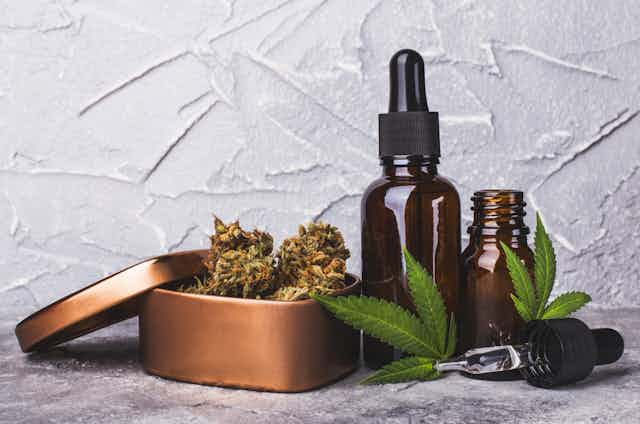As states have legalized marijuana for medicinal and recreational use, and federal law now allows sale of hemp-derived products, cannabis and its derivatives are getting more attention and study. The Conversation has compiled excerpts of articles from scholars who have been watching recent marijuana developments.
1. Studies may support CBD claims
Soaring sales of products containing the marijuana extract CBD followed Congress legalizing CBD in 2018.
CBD sellers and users swear by its ability to relieve pain and anxiety. Although science isn’t yet sure about that, there are reasons for encouragement, writes Hillary Marusak, a professor of psychiatry and neuroscience at Wayne State University.
“Neuroimaging studies in humans show that CBD can reduce activity in the amygdala and anterior cingulate cortex, brain regions associated with stress and anxiety,” she writes.
2. Don’t believe the hype
In 2018, the Food and Drug Administration approved a drug containing CBD to treat seizures from two rare forms of epilepsy. After that, health claims around CBD grew.
C. Michael White, a University of Connecticut pharmacy professor, starts off debunking one of them. “There are no credible animal or human studies showing CBD has any effect on SARS-CoV-2 or the course of COVID-19 infection,” he writes.

“CBD might help with inflammation of the joints or skin, sleep disturbances, chronic anxiety, psychosis and behavioral issues associated with Fragile X syndrome,” White adds, pointing out that some of those conditions already have proven treatments, including other plant extracts.
But while CBD “may do some good for some people,” White suggests caution until scientists learn more about the side effects, drug interactions and potential contamination of CBD products.
3. Marijuana + alcohol = trouble
Among college students, marijuana use is catching up to booze, according to Texas State University psychology professor Ty Schepis. As binge drinking is falling out of favor, “Marijuana use is inching upward,” Schepis writes.
“The number of young adults using both alcohol and marijuana is also rising, heightening concerns about a future surge in substance abuse problems,” he adds. “Young adults in that group also had much higher rates of other illicit drug use, like cocaine, and prescription drug misuse involving medications like opioids or benzodiazepines.”
Read more: College-age kids and teens are drinking less alcohol – marijuana is a different story
4. Legal THC is not well understood
Daniel Kruger and Jessica Kruger, assistant professors at the University of Michigan and the University at Buffalo, respectively, surveyed 500 users of delta-8, a less psychoactive and technically legal type of THC.
The scholars suggest that delta-8 is ripe for more study of its possible benefits which, according to the survey, come without marijuana’s cognitive side effects like paranoia and an altered perception of time. “Many participants remarked how they could use delta-8 THC and still be productive,” the scholars wrote.
They added that survey participants who had been using delta-8 for health conditions said they stopped using pharmaceutical drugs to treat some mental and physical symptoms. “They considered delta-8 THC better than pharmaceutical drugs in terms of adverse side effects, addictiveness, withdrawal symptoms, effectiveness, safety, availability and cost.”
Read more: Can delta-8 THC provide some of the benefits of pot – with less paranoia and anxiety?
Editor’s note: This story is a roundup of articles from The Conversation’s archives.

